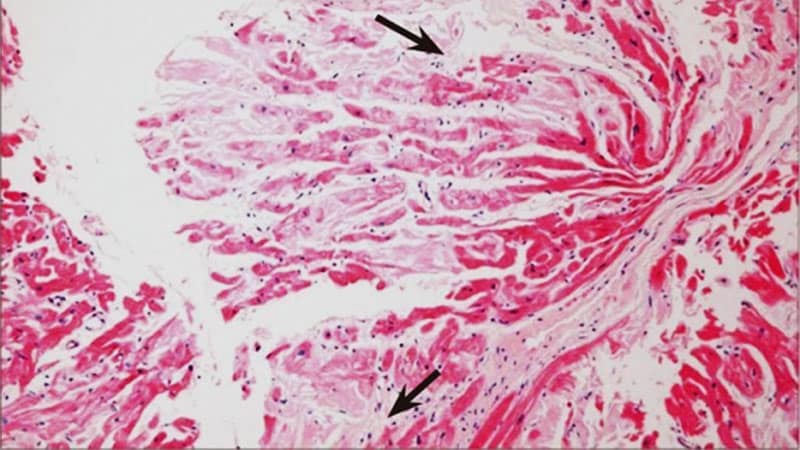Antibody Discovery in Reversing ATTR-CM
Core Concepts
Discovery of antibodies linked to spontaneous reversal of ATTR-CM offers hope for a novel treatment approach.
Abstract
The content discusses the identification of an antibody associated with the spontaneous reversal of cardiac transthyretin amyloidosis (ATTR-CM), a typically fatal condition. Researchers found three patients with ATTR-CM whose condition resolved spontaneously due to the development of antibodies to human ATTR amyloid. This discovery opens up possibilities for a new treatment or potential cure for this progressive disease. The study was published in the New England Journal of Medicine.
Highlights
- ATTR-CM is a fatal condition caused by the accumulation of misfolded protein in the heart.
- Three patients with ATTR-CM showed spontaneous recovery with the development of antibodies to human ATTR amyloid.
- Monoclonal antibodies derived from this discovery could lead to a novel treatment for ATTR-CM.
- Clinical recovery was confirmed through various tests and imaging techniques.
- The cause and significance of the antibodies remain unclear, but they hold promise for treating ATTR-CM.
- Other centers are encouraged to investigate similar cases of spontaneous recovery in patients with ATTR-CM.
Customize Summary
Rewrite with AI
Generate Citations
Translate Source
To Another Language
Generate MindMap
from source content
Visit Source
www.medscape.com
Antibody Linked to Spontaneous Reversal of ATTR-CM
Stats
"The condition resolved spontaneously, with reversion to near normal cardiac structure and function."
"Serial cardiac MRI scans confirmed near-complete regression of myocardial extracellular volume."
"A phase 1 study of this agent was recently published, suggesting that it appeared to reduce the amount of amyloid protein deposited in the heart."
Quotes
"We are very optimistic about this discovery of these antibodies. They could become the first treatment to clear the amyloid that causes this horribly progressive and fatal condition." - Julian Gillmore
"We haven't absolutely proven that the antibodies have caused the clearance of amyloid in these patients, but we strongly suspect this to be the case." - Julian Gillmore
Key Insights Distilled From
by Sue Hughes at www.medscape.com 06-08-2023
https://www.medscape.com/viewarticle/992956
Deeper Inquiries
What implications could the discovery of these antibodies have for other amyloid-related conditions?
The discovery of antibodies linked to the spontaneous reversal of cardiac transthyretin amyloidosis could have significant implications for other amyloid-related conditions. If monoclonal antibodies can be developed based on these findings, it may pave the way for novel treatments for other amyloid-related diseases, such as Alzheimer's disease, Parkinson's disease, and systemic amyloidosis. This discovery opens up the possibility of targeting amyloid deposits in various organs, potentially offering hope for patients suffering from a range of amyloid-related conditions.
Is there a potential downside or risk associated with developing monoclonal antibodies for treating ATTR-CM?
While the development of monoclonal antibodies for treating ATTR-CM shows promise, there are potential downsides and risks associated with this approach. One concern is the possibility of adverse immune reactions or side effects in patients receiving monoclonal antibody therapy. Additionally, the high cost of developing and producing monoclonal antibodies may limit their accessibility to patients, especially in healthcare systems with financial constraints. Furthermore, there is a risk of developing resistance to monoclonal antibodies over time, which could reduce their effectiveness in treating ATTR-CM. Close monitoring and further research are essential to address these potential risks and ensure the safety and efficacy of monoclonal antibody therapy for ATTR-CM.
How might the identification of antibodies in these patients lead to advancements in other areas of medical research?
The identification of antibodies in patients with ATTR-CM and their potential role in the reversal of amyloidosis could lead to advancements in other areas of medical research. This discovery may inspire researchers to explore the use of antibodies in treating other protein misfolding diseases beyond amyloidosis. By understanding how these antibodies interact with amyloid deposits and facilitate their clearance, researchers may uncover new therapeutic targets and treatment strategies for a wide range of protein misfolding disorders. Additionally, the development of monoclonal antibodies based on these findings could open up new avenues for precision medicine and personalized therapies in various medical fields, potentially revolutionizing the treatment of complex diseases with underlying protein misfolding mechanisms.
0
